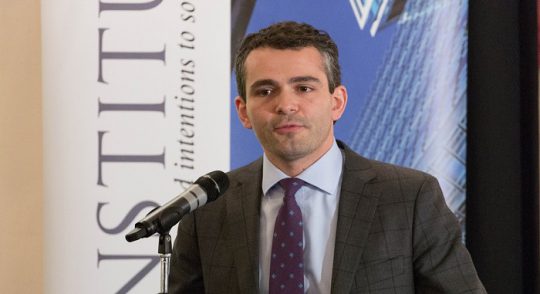
THE BLOOMSBURY HOTEL * LONDON, UK
In the West, we have no trouble conceiving of freedom as a means. Freedom, in this context, is defined as increased liberty to order my life with the maximum level of autonomy consistent with a well-ordered society. But classical man would have understood freedom as an end, according to Ryan T. Anderson, the William E. Simon Senior Research Fellow in American Principles and Public Policy at The Heritage Foundation. “Freedom, rightly understood, is a freedom for” a goal, he said as he delivered the Calihan Lecture at the Acton Institute’s “Crisis of Liberty in the West” conference in London on December 1, 2016. “We no longer know what the West once knew: that the most important freedom is the freedom for excellence, freedom for living in accord with truth.”
Part of the crisis of liberty in the West, he said, stems from bad intellectual defenses of economic freedom, particularly the inability to talk about trade differently – and more honestly. Instead of presenting access to the free market as an inherent human right or the most utilitarian system to meet unlimited human desires in a fallen world, trade must be discussed within its limits – and it must acknowledge those harmed by its unfolding:
[I]f economic freedom does create bad outcomes for communities, that should give us pause in defending it. It should prompt us to ask whether a particular scheme for protecting liberty has gone awry, or needs to be conditioned, or directed, or compensated for in some way. …
If the upper-middle-class way of life was threatened by globalism, open-borders immigration, and new labor-saving robotic technologies, it wouldn’t have taken a Brexit or a Trump victory before the chattering classes took seriously the costs of such innovations, and how they were being distributed. This isn’t to say that the policies proposed by Trump or Sanders would solve these problems. … [T]he failure of these dominant accounts contributes to the public reaction against our economic liberties.
The peculiar form of corporatism/cronyism practiced in the West, and not just incoherent apologies for genuine laissez faire capitalism, has also unfairly jaundiced much of the public against economic liberty.
Many of the criticisms leveled at “free markets” are in reality directed at the exact opposite: crony capitalism, the collusion of Big Business and Big Government, frequently aided and abetted by Big Media and Big Law. Businesses that are too big to fail rig the economic system in their favor, hire the best lobbyists to get government to regulate their industry in their favor, and create barriers to entry for competitors and newcomers, to weaken the labor market. Cronyism takes place whenever these groups collude to set the system up against the little guy and the new guy, when they go outside of transparent normal operating procedures to get a result in their favor, at the expense of the common good.
A declining civil society that fails to respect the proper sphere of each part of society has simultaneously stimulated passions and increased the government’s role in our lives.
But Anderson, a natural law advocate of family life, says the breakdown is most deeply rooted in a misunderstanding of mankind’s nature:
Bad anthropology has sought to liberate man from the very communities where he finds meaning and purpose – alienating man from work, from family, and from God.
The result is a working class without the values and virtues to flourish in the condition of freedom, and a ruling class more devoted to a global community than to their own communities.
The result is a working class increasingly isolated from meaningful relationships and, thus, more anxious about their futures in an age of economic uncertainty; and a ruling class increasingly isolated from their working class neighbors and, thus, unaware of their anxieties.
To restore society, Anderson argues, we must promote a renewed vision of the human person as one who bears the image of God. Social justice flows from an understanding of human nature and his relationship, including his compulsory and often burdensome private duties, to his neighbor:
If we don’t have God for a Father, we won’t see our fellow man as our brother. If we aren’t made in the image and likeness of God, we won’t treat every life as created equal and endowed with unalienable rights – indeed, we’ll view our neighbors as random, meaningless cosmic dust that gets in our way. The challenge before us, then, is to recover at the very least a common understanding of what human flourishing looks like and how all of us should help to make it a reality for more people. …
We must see that our rational capacities can know the good, and that, being self-authors, we must choose the good for ourselves. Of course, there is no such thing as the good life, but as many good lives as is imaginable. And these good lives will be various ways for dependent rational animals to flourish. And that means initiative and enterprise and free choice and self-determination are just as truly basic needs as food and shelter. And that fulfilling our duties to others is the entire point of having the freedom to do so.

